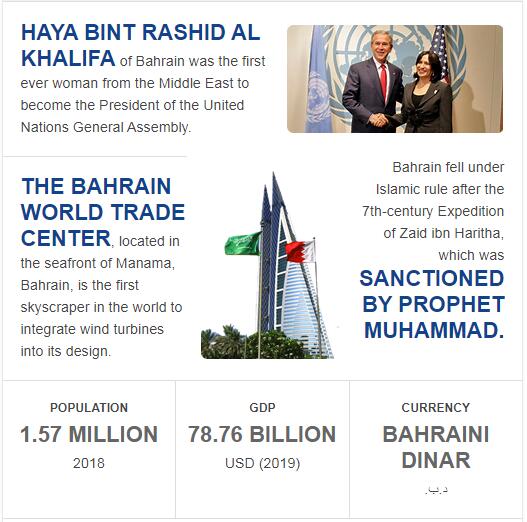The population of Bahrain in 2017 was 1.6 million people, with the majority of the population living in urban areas such as Manama and Muharraq. The economy of Bahrain is heavily reliant on oil and gas, with a GDP of $37.2 billion and a moderate per capita income. Bahrain is a member of the Arab League, Gulf Cooperation Council (GCC), Organization of Islamic Cooperation (OIC) and World Trade Organization (WTO), and has close ties to many countries throughout the Middle East region as well as Saudi Arabia. In terms of politics, Bahrain is a constitutional monarchy with King Hamad bin Isa Al Khalifa as its head of state. The Prime Minister is Khalifa bin Salman Al Khalifa who leads the Sunni-led government which has been in power since 1971. See militarynous for Bahrain military and defense.
Yearbook 2017
Bahrain. Tensions between Sunni and Shi’a Muslims continued throughout the year. The kingdom is ruled by the Sunni Al-Khalifa dynasty but has a Shiite majority. In January, armed men attacked a prison and released several prisoners convicted of terrorist offenses. Riots erupted in the capital Manama the same month after three Shiite men were executed for murder. It was the first executions in six years. Amnesty International condemned the executions. Shia Muslim opposition leader Ali Salman received his prison sentence in April, shortened from nine to four years. He was arrested in December 2014, charged with civil disobedience and “hatred of the royal house”. In May, people were killed by police in connection with a demonstration in a Shiite village. Nearly 300 people were arrested. See ABBREVIATIONFINDER for frequently used acronyms and abbreviations related to as well as country profile of Bahrain.
According to Countryaah.com, Bahrain, together with Egypt, the United Arab Emirates, Saudi Arabia and Yemen, broke diplomatic relations with Qatar in early June. The reason is that Qatar is accused of supporting terrorist groups.
After Lebanon’s Prime Minister Saad al-Hariri announced his departure in early November and took refuge in Saudi Arabia, Bahrain, the United Arab Emirates, Kuwait and Saudi Arabia urged their citizens to leave Lebanon immediately. The reason for this was somewhat unclear, but concerns about an escalated conflict with – and in – Lebanon are certainly behind the decision.

Bahrain
State of Southwest Asia; archipelago of the Persian Gulf – made up of five main islands (Bahrain la major, al-Muḥarraq, Umm Nasan, Sitra, Hawar) and other smaller islands – adjacent to the NE coast of the Arabian Peninsula and to the NW of the Qaṭar peninsula. The capital Manama is on the island of Baḥrain. Exposed to the climatic influences of the Arabian desert, the archipelago has very hot summers and mild winters, with very little rainfall.
The population, for the most part Arab, is mainly urban (92.5% in 2001) and has a modern network of services. Relevant is the presence of foreign workers (mainly; Pakistanis, Indians, Filipinos), mostly employed in oil activities.
The first Arab Gulf country to produce oil in 1932, Bahrain has relatively modest reserves. The progressive depletion of oil reserves was offset by a strengthening of the capital-intensive industry; Furthermore, as part of a policy of economic diversification, a great boost was given to other more active production sectors such as the chemical, petrochemical, metallurgical and shipbuilding sectors. The large Sitra refinery (completely renovated and refurbished), is among the largest in the Near East, and processes significant quantities of crude oil from Saudi Arabia. The tertiary sector also had great development, centered on the role of an offshore financial centermainly used by Arab countries for the investment of petrodollars in the international market. Agriculture, on the other hand, plays a completely marginal role; the cultivated area is mostly located in a coastal strip to the North and NE of the main island (dates and tomatoes are exported). There is abundant cheap electricity, produced with natural gas, the reserves of which, at current extraction rates, should ensure production until 2015. Fishing is also widely practiced. Tourism is expanding. Al-Muḥarraq International Airport.